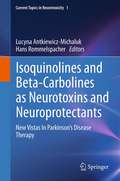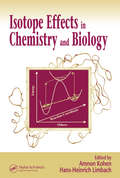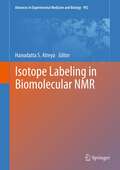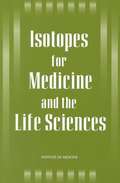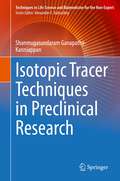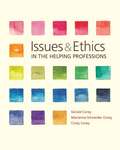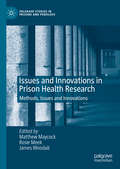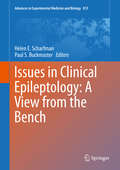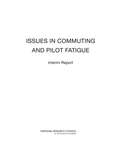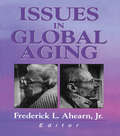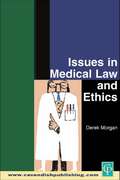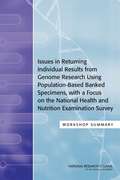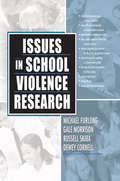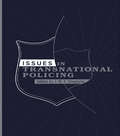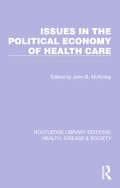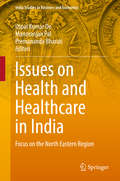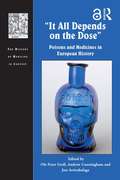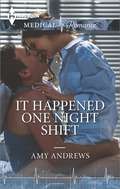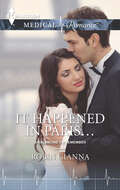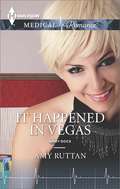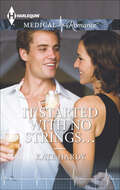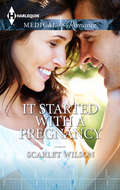- Table View
- List View
Isoquinolines And Beta-Carbolines As Neurotoxins And Neuroprotectants
by Lucyna Antkiewicz-Michaluk Hans RommelspacherThe specific topic, "Isoquinolines And Beta-Carbolines As Neurotoxins And Neuroprotectants - New Perspectives In Parkinson`S Disease Therapy," was chosen in light of accumulating neurobiological evidence indicating that, in addition to exogenous neurotoxins (e.g., 1-methyl-4-phenyl-1,2,3,6-tetrahydropyridine [MPTP]), endogenous compounds may play an important role in the most common neurodegenerative disorders (e.g., Parkinson`s disease). Two groups of amine related compounds, which appeared chemically like MPTP, were detected in human brain and cerebrospinal fluid (CSF): ß-carbolines (BCs) and tetrahydroisoquinolines (TIQs). These are heterocyclic compounds formed endogenously from phenylalanine/tyrosine (TIQs) and tryptophan, tryptamine, and 5-hydroxytryptamine (BCs), respectively and exert a wide spectrum of psychopharmacological and behavioral effects. The TIQs and BCs may bind to their own high affinity sites on neuronal membranes associated with or located close to the receptors of neurotransmitters. Research on TIQs and BCs is stimulated also by their possible role in pathological conditions, especially parkinsonism and alcoholism. Recently, clinical interest has been spurred by their role as neuroprotective, and even neurorestorative, anticonvulsant and antiaddictive, substances. In this book we are going to summarize, for the first time, the results from behavioral, neurochemical and molecular experiments, which demonstrate a wide spectrum of TIQs and BCs effects - from their rather mild neurotoxic actions to the important neuroprotective and antiaddictive properties. Additionally, the recent results of experimental studies in vivo have allowed a much better understanding and simultaneous comparison of the neurochemical and molecular mechanisms underlying the neuroprotective and neurotoxic actions of endogenous TIQs and BCs and have pointed to the possibility of their therapeutic applications in neurodegenerative diseases such as Parkinson's disease.
Isotope Effects In Chemistry and Biology
by Amnon Kohen Hans-Heinrich LimbachThe field of isotope effects has expanded exponentially in the last decade, and researchers are finding isotopes increasingly useful in their studies. Bringing literature on the subject up to date, Isotope Effects in Chemistry and Biology covers current principles, methods, and a broad range of applications of isotope effects in the physical, biolo
Isotope labeling in Biomolecular NMR
by Hanudatta S. AtreyaNMR spectroscopy has undergone a revolution in recent years with the advent of several new methods overcoming the problems of sensitivity and resolution. Recent developments in biotechnology have made it easier and economical to introduce 13C, 15N and 2H into proteins and nucleic acids. At the same time, there has been an explosion in the number of NMR experiments that utilize such isotope labeled samples. Thus, a combination of isotopic labeling and multidimensional, multinuclear NMR has opened up new avenues for structural studies of proteins, nucleic acids and their complexes. This book will focus on recent developments in isotope labeling methods for structural studies of small molecules, peptides, proteins and nucleic acids. The aim of the book is to serve as a compendium of isotope labeling for the biomolecular NMR community providing comprehensive coverage of the existing methods and latest developments along with protocols and practical hints on the various experimental aspects. The book will cover a wide range of topics in isotope labeling under one title including emerging areas of metabolonomics and solid state NMR.
Isotopes for Medicine and the Life Sciences
by Committee on Biomedical IsotopesRadioactive isotopes and enriched stable isotopes are used widely in medicine, agriculture, industry, and science, where their application allows us to perform many tasks more accurately, more simply, less expensively, and more quickly than would otherwise be possible. Indeed, in many cases--for example, biological tracers--there is no alternative. In a stellar example of "technology transfer" that began before the term was popular, the Department of Energy (DOE) and its predecessors has supported the development and application of isotopes and their transfer to the private sector. The DOE is now at an important crossroads: Isotope production has suffered as support for DOE's laboratories has declined. In response to a DOE request, this book is an intensive examination of isotope production and availability, including the education and training of those who will be needed to sustain the flow of radioactive and stable materials from their sources to the laboratories and medical care facilities in which they are used. Chapters include an examination of enriched stable isotopes; reactor and accelerator-produced radionuclides; partnerships among industries, national laboratories, and universities; and national isotope policy.
Isotopic Tracer Techniques in Preclinical Research (Techniques in Life Science and Biomedicine for the Non-Expert)
by Shanmugasundaram Ganapathy-KanniappanThis book serves as a practical guide and a manual on the application of isotopic tracers in understanding the cellular processes (e.g. molecular interactions, protein synthesis) in growth, development, and disease conditions. The techniques described in the book have been carefully chosen to underscore the role and relevance of isotopic tracers in the identification of molecular targets and mechanisms, and preclinical validation of potential therapeutics. This book is intended to be a valuable resource to non-experts that may include students, researchers, educators/teachers, and others who have an interest to understand the application of isotopic tracers in research. Each chapter includes a background, an outline of the method and underlying principles, and a detailed step-wise protocol. To augment the clarity and intellectual grasp, the chapters also include relevant illustrations and study questions. More importantly, the book covers techniques involving radioactive as well as non-radioactive tracers to expand the scope of isotopes in preclinical research including basic and applied science.
Issues and Ethics in the Helping Professions (10th Edition)
by Gerald Corey Marianne Schneider Corey Cindy CoreyUp-to-date and comprehensive, this practical best seller provides students with the basis for discovering their own guidelines for helping within the broad limits of professional codes of ethics and divergent theoretical positions. Respected authors Gerald Corey, Marianne Corey, and Cindy Corey raise what they consider to be central issues, present a range of diverse views on the issues, discuss their position, and provide opportunities for students to refine their thinking and develop an informed position. With new material in every chapter and an emphasis on critical thinking, Issues and Ethics in the Helping Professions, 10th Edition, is useful for students as well as practicing professionals.
Issues and Innovations in Prison Health Research: Methods, Issues and Innovations (Palgrave Studies in Prisons and Penology)
by James Woodall Rosie Meek Matthew MaycockThis book constitutes the first publication to utilise a range of social science methodologies to illuminate diverse and new aspects of health research in prison settings. Prison contexts often have profound implications for the health of the people who live and work within them. Despite these settings often housing people from extremely disadvantaged and deprived communities, many with multiple and complex health needs, health research is generally neglected within both criminology and medical sociology. Through the fourteen chapters of this book, a range of issues emerge that the authors of each contribution reflect upon. The ethical concerns that emerge as a consequence of undertaking prison health research are not ignored, indeed these lie at the heart of this book and resonate across all the chapters. Foregrounding these issues necessarily forms a significant focus of this introductory chapter. Alongside explicitly considering emerging ethical issues, our contributing authors also have considered diverse aspects of innovation in research methodologies within the context of prison health research. Many of the chapters are innovative through the methodologies that were used, often adapting and utilising research methods rarely used within prison settings. The book brings together chapters from students, scholars, practitioners and service users from a range of disciplines (including medical sociology, medical anthropology, criminology, psychology and public health).
Issues in Aging and Vision: A Curriculum for University Programs and In-service Training
by Alberta L. OrrThe demographics and psychosocial aspects of aging and vision loss, community-based services for blind older persons, improving access to vision rehabilitation.
Issues in Clinical Epileptology: A View from the Bench
by Helen E. Scharfman Paul S. BuckmasterThis book is dedicated to Dr. Philip A. Schwartzkroin. The book has a novel format because it is not intended to be a set of reviews. Instead, it is an effort to explore important topics in the epilepsy research field. Because articles are written by leaders in the field who have years of experience and individuals with diverse expertise, articles are likely to have a long-lasting impact and be relevant for both epileptologists and neuroscientists. Authors address topics that are important, unresolved questions in the field of epilepsy research, drawing on available data from both the bench and the clinic to support their points. A given topic is addressed by one or more authors, each writing from his/her own unique perspective. For all of the individuals who have been trained or worked with Philip Schwartzkroin in the past and/or have appreciated his contributions to the epilepsy field, this volume is an excellent way to celebrate his achievements and look to the ways they have moved the field forward and continue to stimulate its growth.
Issues in Commuting and Pilot Fatigue: Interim Report
by Board on Human-Systems IntegrationThe potential for fatigue to negatively affect human performance is well established. Concern about this potential in the aviation context extends back decades, with both airlines and pilots agreeing that fatigue is a safety concern. A more recent consideration is whether and how pilot commuting, conducted in a pilot's off-duty time, may affect fatigue. The National Academy of Sciences was asked to review available information related to the prevalence and characteristics of pilot commuting; sleep, fatigue, and circadian rhythms; airline and regulatory oversight policies; and pilot and airline practices. This interim report summarizes the committee's review to date of the available information. The final report will present a final review, along with the committee's conclusions and recommendations based on the information available during its deliberations.
Issues in Global Aging
by Frederick L Ahearn JrGain a new perspective on the international implications of our aging population!This comprehensive book examines a broad array of international concerns in gerontology. Issues in Global Aging addresses the implications of the rapid growth in elderly populations in both the Third World and industrialized nations including the US, Israel, Pakistan, and the UK. It examines successful policy and programmatic approaches to dealing with the practical needs of older citizens for health care, pensions, work, and personal care.Issues in Global Aging brings together case studies, empirical research, and theoretical exploration of policies and services for the elderly around the world. It also considers the spiritual dimension of aging and the influence of various religious and cultural beliefs on gerontology policy and practice.Issues in Global Aging addresses urgent questions concerning the ever-increasing elderly population, including: what are the economic implications of the demographic shift toward an older population? who is responsible for caring for the elderly in various cultures? how can older people find economic security? how does spiritual practice give older people self-esteem and a sense of personal meaning?Issues in Global Aging is an essential source of fresh thought and useful research for gerontologists, social workers, policymakers, economists, and ministers who work with older people.
Issues in Medical Law and Ethics
by Derek MorganThirty years ago, English jurist Patrick Devlin wrote: "Is it not a pleasant tribute to the medical profession that by and large it has been able to manage its relations with its patients ... without the aid of lawyers and law makers". Medical interventions at the beginnings and the endings of life have rendered that assessment dated if not defeated. This book picks up some of the most important of those developments and reflects on the legal and social consequences of this metamorphosis over the past ten years, and will be of interest to students of law, sociology and ethics who want a considered and critical introduction to, and reflection on, key issues in these pivotal moments of human life.
Issues in Returning Individual Results from Genome Research Using Population-Based Banked Specimens, with a Focus on the National Health and Nutrition Examination Survey: A Workshop Summary
by Kevin KinsellaPopulation surveys traditionally collect information from respondents about their circumstances, behaviors, attitudes, and other characteristics. In recent years, many surveys have been collecting not only questionnaire answers, but also biologic specimens such as blood samples, saliva, and buccal swabs, from which a respondent's DNA can be ascertained along with other biomarkers (e. g. , the level of a certain protein in the blood). The National Health and Nutrition Examination Survey (NHANES), sponsored by the National Center for Health Statistics (NCHS), has been collecting and storing genetic specimens since 1991, and other surveys, such as the Health and Retirement Study (HRS) funded by the National Institute on Aging, have followed suit. In order to give their informed consent to participate in a survey, respondents need to know the disposition and use of their data. Will their data be used for one research project and then destroyed, or will they be archived for secondary use? Sponsors of repeated cross-sectional surveys, such as NHANES, and of longitudinal surveys that follow panels of individuals over time, such as HRS, generally want to retain data for a wide range of secondary uses, many of which are not explicitly foreseen at the time of data collection. They typically inform respondents that their data will be stored in a secure manner and may be provided to researchers with suitable protections against individual identification. The addition of biologic specimens to a survey adds complications for storing, protecting, and providing access to such data and measurements made from them. There are also questions of whether, when, and for which biologic measurements the results should be reported back to individual respondents. Recently, the cost of full genomic sequencing has plummeted, and research findings are beginning to accumulate that bear up under replication and that potentially have clinical implications for a respondent. For example, knowing that one possesses a certain gene or gene sequence might suggest that one should seek a certain kind of treatment or genetic counseling or inform one's blood relatives. Biomedical research studies, in which participants are asked to donate tissues for genetic studies and are usually told that they will not be contacted with any results, are increasingly confronting the issue of when and which DNA results to return to participants. Issues in Returning Individual Results from Genome Research Using Population-Based Banked Specimens, with a Focus on the National Health and Nutrition Examination Survey is the summary of a workshop convened in February 2013 by the Committee on National Statistics in the Division of Behavioral and Social Sciences and Education of the National Research Council. This report considers how population surveys, in particular NHANES, should implement the reporting of results from genomic research using stored specimens and address informed consent for future data collection as well as for the use of banked specimens covered by prior informed consent agreements. The report will be of interest to survey organizations that include or contemplate including the collection of biologic specimens in population surveys for storing for genetic research. The issues involved are important for advancing social, behavioral, and biomedical knowledge while appropriately respecting and protecting individual survey respondents.
Issues in School Violence Research
by Rusell Skiba Gale Morrison Michael Furlong Dewey Gene CornellExplore the most effective methods of studying school violence!School violence and safety research will move forward and make unique scientific contributions only if it develops a core literature that critically examines its measurements, methods, and data analysis techniques. Issues in School Violence Research is the first book to expose the limitations of previous research, to critically examine methodological and measurement practices, and to provide guidelines to enhance future school violence research. Early literature focused on school violence as a social problem, not as an integrated area of legitimate scientific research. It is time to move beyond the social problem era of school violence to begin critically assessing its common research practices.Until recently, there has been such a rush to gather information about school violence that the methods used have hardly been questioned. The editors of this book are some of the first to raise questions about how the field conducts its research, especially with regard to self-reports among students. Issues in School Violence Research addresses significant measurement and methodological issues in school violence research. The contributors have been conducting school research for more than 15 years. To enhance your understanding of the practices used-past and proposed-numerous tables are included.In Issues in School Violence Research, you&’ll find information about: school-level warning signs of safety problems weapon possession using office referral records in school violence research identification of bullies and victims data quality issues in student risk behavior surveys extreme response bias patterns for youth risk behavior surveys the structure of student perceptions of school safety and much more!Issues in School Violence Research is an important resource for anyone, from professors to policymakers. It is also appropriate as a textbook for research methodology courses. It is only through objective analysis that school violence research can develop new insights. This book presents topics that should stimulate new and better inquiry into the climate within which school violence occurs.
Issues in Transnational Policing
by J. W. E. SheptyckiGlobalisation, the wired planet, the global village, these are a few of the terms associated with the social and political changes that are said to describe the world at the beginning of the new millennium. One of the most important institutions of the social ordering has been that of policing, but very little has been written on how the practices of social control are affected by the processes of transnationalisation. This book brings together contributions by experts on policing that focus on some of the newly emergent policing issues connected with these changes:*the global private security industry*cross national networking between police*the establishment of an international criminal court*money laundering *policing cyberspace*the drug warIssues in Transnational Policing crosses the boundaries between criminology, international relations and international law to provide a thought-provoking picture of the complex issues surrounding the politics of policing in the future.
Issues in the Political Economy of Health Care (Routledge Library Editions: Health, Disease and Society #25)
by John B. McKinlayOriginally published in 1984, this book attempted to fill a gap by providing a broad-ranging structural analysis of the health care sector and the political and economic forces which influence its shape and contents, both in the western world and developing countries. The contributors examine the relationships of capitalism to health care, in terms of its influence on the physical environment, the incidence of social diseases and the prevailing (20th Century) view of what constitutes health itself; and in terms of the consequences of the new medical industrial complex it has created, such as the declining provision of health care for the poor and disadvantaged and the growing power of the pharmaceutical industry.
Issues on Health and Healthcare in India
by Utpal Kumar De Manoranjan Pal Premananda BharatiThis book addresses health and healthcare issues in India with a special focus on the Northeast region. Pursuing a multidisciplinary approach, it highlights key issues in health and healthcare and outlines the actions needed to achieve the desired results in these areas as laid out in the UN Millennium Development Goals. In addition to introducing some new questions on health and healthcare development, it presents cross-country analyses, and examines the convergence of healthcare across Indian states, as well as mortality and morbidity in the Northeast. The book also explores the regional complexities involved in the discussion of these topics. It presents a number of specific techniques, such as two-level logistic regression, analysis of mental health, probabilistic and predictive analysis of nutritional deficit, and generalized linear mixed models, that can be used to analyze mortality and morbidity and factors affecting out-of-pocket expenses in the healthcare context. Lastly, it presents concrete case studies substantiating the theoretical models discussed. As such, the book offers a valuable resource for health researchers, professionals and policymakers alike.
It All Depends on the Dose: Poisons and Medicines in European History (The History of Medicine in Context)
by Ole Peter Grell Andrew Cunningham Jon ArrizabalagaThis is the first volume to take a broad historical sweep of the close relation between medicines and poisons in the Western tradition, and their interconnectedness. They are like two ends of a spectrum, for the same natural material can be medicine or poison, depending on the dose, and poisons can be transformed into medicines, while medicines can turn out to be poisons. The book looks at important moments in the history of the relationship between poisons and medicines in European history, from Roman times, with the Greek physician Galen, through the Renaissance and the maverick physician Paracelsus, to the present, when poisons are actively being turned into beneficial medicines.
It Happened One Night Shift
by Amy AndrewsA stolen kiss in the ER Five years ago brooding ex-military medic Gareth Stapleton lost his beloved wife to breast cancer. Since then he's kept his distance from everything and everyone. Until Dr. Billie Ashworth-Keyes waltzes into his life and turns it upside down... Gareth is intrigued by the vivacious ER doc, but he knows she's off-limits. Then, one night shift, Gareth finds himself locked in the hottest kiss of his life! Suddenly he realizes that Billie is exactly what he needs to make his days-and nights-a lot more meaningful!
It Happened in Paris . . . (A Valentine to Remember #722)
by Robin GiannaWhen work brings a cardiologist to Paris, a Valentine’s Day fling leads to more complicated matters of the heart in this charming medical romance. Avery Girard might have sworn off men, but she can’t help getting swept away by the beauty, magic and romance of Valentine’s Day in Paris . . . especially when she ends up spending it with totally irresistible Dr. Jack Dunbar. One little fling can’t hurt, right? Wrong! After an afternoon of passion, Avery discovers that Jack is actually the cardiologist she is meant to be assessing! And while she’s normally capable of maintaining her professional cool, her heart keeps skipping a beat every time she sees Jack.
It Happened in Vegas
by Amy RuttanThe hero she never forgot... Keeping out of the spotlight isn't easy for senator's daughter Dr. Jennifer Mills...especially after being jilted at the altar by her ex-fiancé! Arriving in Las Vegas, she's just hoping to blend in... But then she meets ER surgeon Nick Rousseau-the same man she spent an unforgettable night with three years earlier! Now returned from Afghanistan, ex-army medic Nick is struggling to come to terms with his time on the front line. Rekindling his romance with Jennifer reminds this brooding doctor that some things in life are still worth fighting for...
It Started with No Strings . . .
by Kate HardyShe can blame one night on the champagne, but what happens after that is the fault of a swoon-worthy coworker who just might heal her broken heart.At a London salsa club, consultant Aaron Hughes catches sight of the most beautiful woman he’s ever seen. Relationships are off the cards for Aaron, but one night with this perfect stranger can’t hurt . . . For registrar Joni Parker, dancing and champagne are a remedy to what-would-have-been-her-wedding-night blues. Until she discovers an even better cure—her first-ever fling! It started with no strings, but when Aaron walks into the hospital on Monday—as the new consultant!—things get a lot more complicated . . .
It Started with a Pregnancy
by Scarlet WilsonDr Cooper Roberts has a new job and the chance to begin a new life. What’s most definitely not in his plans? Waking up with his new colleague, Melissa Bell... And having to hold his head up above the dropped jaws of his fellow docs as he escorts Missy to buy a pregnancy test!
It Started with a Winter Kiss
by Tina BeckettVoted most likely to marry…Will they finally have the chance?Dr. Dexter Chamblisse always has a plan. He just hadn’t planned on an ER reunion with his high school sweetheart, Maura! She may work in his hospital, but Dex has tried to keep his distance. He can’t bear to be reminded of the tragic accident that tore them apart. But it’s getting harder to ignore the sparks still flying between them… Could this be their second-chance Christmas?From Harlequin Medical: Life and love in the world of modern medicine.
It Takes a Worried Man: A Memoir
by Brendan HalpinThis book is a horror story and a comedy, but, most of all, it is a love story written when the author's wife was diagnosed with breast cancer. It is the story of what happens to a man who fears that his best friend might leave him forever.
